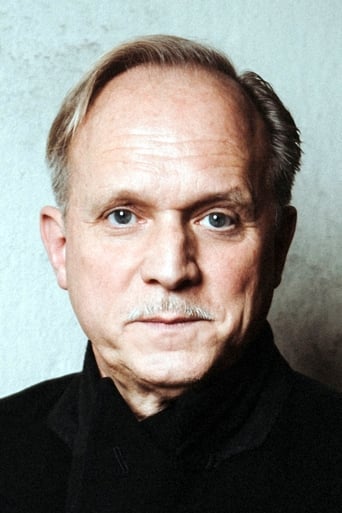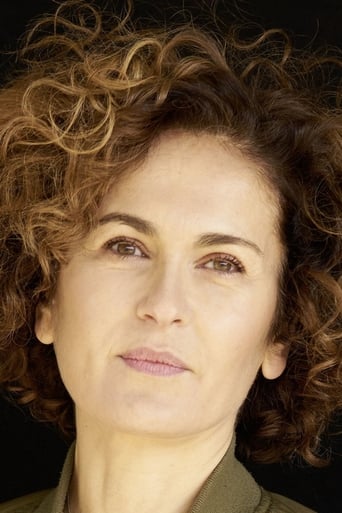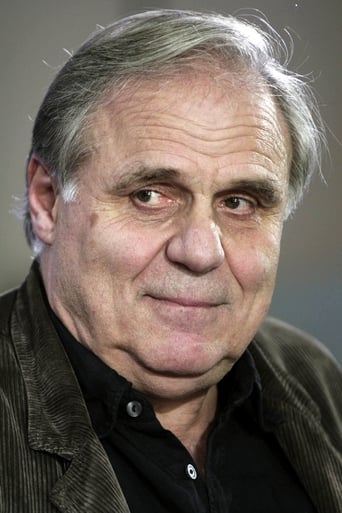SpuffyWeb
Sadly Over-hyped
Intcatinfo
A Masterpiece!
Bea Swanson
This film is so real. It treats its characters with so much care and sensitivity.
Philippa
All of these films share one commonality, that being a kind of emotional center that humanizes a cast of monsters.
kosmasp
Growing up you will encounter many things that will amaze you or mature you. Going on a trip with your dad will open your eyes. Even if your dad is busy with business, you will learn things. This dad is not all cliché though, he does have an interest in his boy, even though he broke up with his mom a while ago.But the boy has a mind of his own, trying and figuring things on his own, going places and doing things that might be considered stupid. Or just naive, as his nature seems to be. Someone who wants to explore and see things and help even if he doesn't understand how things work or what cultural differences might mean ... love conquers all? Maybe it's more like "life conquers all" and you should live it, as best as you can
Horst in Translation (filmreviews@web.de)
Let me apologize for that play of words. Exit Marrakech is Caroline Link's new film and her first work in five years, slightly over 10 years after she won the Foreign Language Oscar for "Nowhere in Africa". Josef Bierbichler, who played the central male character in her last movie is in here as well, even if only for a very short scene as promising young actor Samuel Schneider is the center here. He plays a teenager named Ben. Ben spends the summer holidays with his dad, who he has not seen for quite some time, in Morocco. All in all, Schneider carries the film nicely during its two hours and has a good scene here and there. Same could be said for Hafsia Herzi, who proves here that she is more than just eye-candy. The real heart of the film is Ulrich Tukur, however, as a career-driven, family-repellent father who tries to rebond with his son and it takes extraordinary dangerous situations until he finally succeeds. All the scenes he's in and especially his interactions with Schneider's character are the should of the movie and even if he is not really the central character, this movie is much more about him opening up and becoming a good father thanks to a change in character than about a particularly mentionable development by Ben. He's a anti-authority student early on and this does not really change until the end. My favorite scene in their trouble relationship was basically when Ben sung a certain lullaby to Karima and later we hear the father sing the same to Ben. A truly sweet moment, which showed there's always been bridges between the two. They just need reconditioning.I'm not really sure how I liked the diabetes sub-plot as it was really obvious from very early on that this is gonna be a problem and there will be some huge dramatic escalation towards the end. Generally I don't mind predictability in movies if it is executed well, but I still believe it could have done better and more quietly impressive than Ben falling down theatrically in front of the other car. There's a couple other minor criticisms, but neither is severe enough to say the film is not worth recommending. I liked how they did not go for an unrealistic happy-ending love story, but choose a way with which it all ended kinda messy with the bonding between Karima and Ben. Sure it was sad how things unfolded, but there really was no other option that would not have sacrificed credibility. Beyond that, the Moroccan landscapes were truly beautiful to watch and one of the main reasons why this needs to be seen on the big screen. Of course, fine cinematography is almost a given for Link, as we know from her earlier works as well. So yeah, "Exit Marrakech" is very much worth a watch.
larry-411
Set in Morocco, this rich coming-of-age picture stars Samuel Schneider as Ben, a German teen whose father, Heinrich (Ulrich Tukur) is on the road staging theater productions. On summer break, Ben travels to Marrakech where his dad is directing a show. Ben has been living with his mother while his estranged father has been pursuing his career (and other carnal interests). In a common theme for the genre, the boy is torn between two worlds, the one he's comfortable with in his native country and that of his father, a man he hardly knows yet is a magnet for an impetuous youth whose sense of adventure (and own carnal desires) will draw him to this colorful land. It's a classic story done with a passionate attention to detail -- a boy on the cusp of manhood placed into a strange world where anything is possible.This is only the sixth narrative feature for writer/director Caroline Link, yet the acclaimed German filmmaker already has a slew of honors to her credit. She won the Oscar for Best Foreign Language Film in 2003 for Nowhere in Africa. Five years after her last film she's back with Exit Marrakech (AKA Morocco).The film's success rests largely on the shoulders of young Schneider. Just 17 at the time, his casting was a bold move, as the teen was essentially a non-professional actor with just one feature to his credit along with several television productions. There's certainly no paucity of German talent, yet Link smartly took a chance on a relative newcomer for a demanding role that carries the picture from start to finish. It was tailor-made for him, to some extent, as the original script called for an awkward 14-year-old. Schneider is anything but, testament to how enamored she was with his charismatic presence and natural talent. Just a typical German schoolboy, the level of authenticity of his performance is central to the movie's rise above what could have been an all-too-familiar storyline. He's destined for stardom.Tukur is an award-winning legend in Germany, having successfully crossed over into the international market in films like The Lives of Others (2006) and The White Ribbon (2009). Still, his character is secondary to Schneider's, and the older actor's experience shows in his on screen generosity. Basically a two-character study, Exit Marrakech feels unscripted as the natural bond between Ben and father Heinrich develops in sync with that of actors Schneider and Tukur. The growing affection between the two is palpable, although a great deal of patience is required on the part of the viewer as the layers are slowly peeled away.Ben's love interest Karima, played by Hafsia Herzi, is a young French actress who won France's equivalent of the Oscar in 2007 as Most Promising Newcomer. She's simply delightful in her portrayal of a girl spotted by Ben along the way, a local whose traditional ways cast an exotic spell on the boy. The time Ben spends with Karima are some of the most thoughtful, heartfelt sequences in the film.Link smartly sticks with the same creative team that gelled so well on her previous projects. Cinematographer Bella Halben also shot her last movie, while both composer Niki Reiser and editor Patricia Rommel worked on her previous four titles. The unspoken language of experienced collaborators translates into a beautifully orchestrated production that's magnificent in its execution.Exit Marrakech has a foreign film sensibility from the start, with a look and sound honors the local culture, amounting to a polished family travelogue. Production values are high but stray from Hollywood slick. Natural lighting is used in scenes where villages have no electricity and the action is lit by candlelight and lanterns. Halben's camera-work is simply stunning, a loving video postcard from Morocco. Marrakech is full of life, and one can almost smell the marketplace where Ben begins to discover local treasures. As the narrative moves from the city to the mountains to the dunes, we can feel the dust rising from the desert floor. Many scenes employed guerrilla filmmaking, eschewing permits, as the camera captures real life, literally, and local residents – not actors – throughout Ben's journey. Halben often relies on hand-held camera, with numerous intimate closeups of the young man as he's lit like a Greek (German) god. The camera loves him, and the audience's emotional relationship with the boy is key to the film's effect on the viewer.Reiser's score is a mashup of traditional Middle Eastern music and contemporary styles. The plaintive, haunting strains of Moroccan songs match the changes that take place in the protagonist's persona.Coming-of-age films are ubiquitous at festivals and tend to be somewhat formulaic. The often predictable character arcs are filled with mild tension, both psychological and sexual. In this case (as in many), the parents split because of a cheating husband, leaving the boy to grow up without a father figure. The estranged dad makes repeated feeble attempts to bond with his adolescent son. Vacation comes along and the boy makes the decision to go to his father's place abroad, which he sees not so much as a chance to reconcile with his dad as much as an opportunity to wander off and find himself. What happens next is believable or not in direct proportion to the credibility of the son's performance, and that's where Exit Marrakech departs from the norm. The initially brooding Ben endears himself to the audience through playful interactions with the local kids. That Ben is surprisingly sweet is something we see coming, but it reveals itself slowly, as his guard comes down and he opens up to the possibilities presented by this new world. These are themes we've seen before, but not done with this much cultural richness and grace.At just over two hours, Exit Marrakech is a Cinemascope widescreen mini-epic that's sure to be an audience-pleaser. Put it on your radar. You'll be glad you did.
lucasnochez
The highs and lows of father son relationships is one that is often explored in the world of cinema, especially within the festival circuit. Adventures that allow both men to interact and bond are usually presented through the road trip narrative archetype. Exit Marrakech or Morocco (the film is being presented with two different titles for reasons unknown), is a fresh new entry into this genre which uses the exotic Moroccan locale as the backdrop and additional protagonist in this warm story of different worlds, forbidden love and growing onwards.Director Caroline Link does a masterful job with directing and writing duties, nailing the nuances between father and son dialogue, physical responsiveness and subtle body language that accolades her narrative even further.Ben (newcomer Samuel Schneider) is just like any adolescent in the world right now; closed out to his family and teachers but Mr. Personality with his friends and strangers on the streets. Living a privileged life, Ben finds his summer turned upside down when he isn't able to spend it with his fiends in Nice, France, instead, packs his things and heads to Morocco, spending the summer with his estranged theatre director father (Ulrich Tukur). Once Ben arrives in Morocco, he is anxious to leave; spending very little time with his father and spending even less time caring about his father's newest original stage production. Fearless and unwilling to except the faux hotel life his father has adopted, Ben surrenders to the streets of Morocco, inevitably finding friends, falling in love with a beautiful prostitute Karima (Hafsia Herzi) and skiing down the sand dunes of the desert. Exit Marrakech is an intelligent yet devious film that uses the foundation of the political, religious and economic uncertainties of the country at the forefront of the film and allows them to dictate key plot points that allow Ben to morph from a boy to a man in one seemingly idyllic summer. Exit Marrakech won't be the breakout film of the Toronto International Film Festival. nor will it see an extensive theatrical run due to its choppy and short lived emotionally empty editing choices and lack of chemistry with its actors. Schnider's character, Ben, is the glue of the film, connecting the European with African cultures. But the film itself continues the trend Link has and her fascination with analyzing people out of their comfort zone.Link's 2001 Nowhere In Africa made a big splash and won the Best Foreign Language Film of the year Academy Award in 2002. Here, like with Nowhere In Africa, Link is fascinated with countries that have so many sides and worlds within its small boundaries. Morocco, a country with three languages, many political viewpoints and an abundance of culture, is a fusion country with a polarized sense of identity. Which, mirrored against Link's characters, seems just right.The film is a satisfying festival piece that will deliver to its niche festival audience. Essentially, Exit Marrakech is a really safe way to explore the beauty of a gorgeous, misunderstood and mischievous city filled with pit-picketers, Gypsies and berbers. The film itself serves as a travelling art-piece and window for a safe distance to travel to a part of the world that isn't as gracious and kind as it is to its protagonists make it out to be.Night Film Reviews: 6.5/10 Stars



